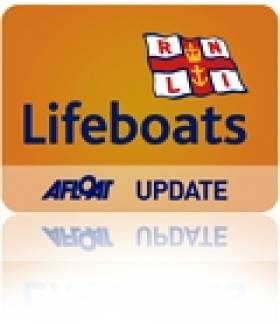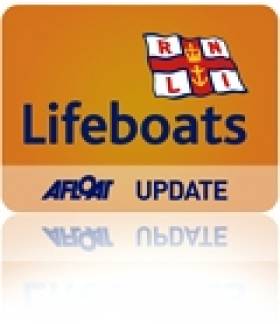Displaying items by tag: Fouled
#RNLI - A fishing vessel with a fouled propeller was towed to safety by Wicklow RNLI this morning (21 June).
The volunteer crew launched their all-weather lifeboat at 10am following a report that a fishing vessel was in difficulty after a rope got fouled in its propeller.
The incident had echoes of Wednesday's rescue of a couple from their similarly fouled yacht off Arklow, as reported on Afloat.ie.
Wicklow RNLI's lifeboat crew located the drifting vessel was located by the lifeboat crew some six miles off Wicklow Head shortly after 10.30am.
A towline was quickly established and the boat was towed back to Wicklow harbour where it was safely secured alongside the south quay at midday.
Another fouling incident occurred further up the coast yesterday evening, as Skerries RNLI yesterday brought two people to safety after their motorboat got into difficulty.
The volunteer crew launched their inshore lifeboat on what was their second call out of the day shortly after 7pm following a report that a 29ft motorboat was in difficulty between Rogerstown Estuary and Lambay Island.
Weather conditions at the time were calm with a force one to two wind. Arriving on scene, the lifeboat – helmed by Willie Boylan – quickly located the motorboat which had lowered its anchor to wait for help to arrive.
Once it was established that the motorboat had fouled its propeller, a crew member was put on board the boat and a towline was established. The vessel was then brought safely back to Malahide Marina.
Speaking after the call-out, Skerries RNLI crew member Conor Walsh said: "Thankfully the crew had a VHF radio on board and were able to call for help. We were happy to assist and to be able to bring them and their boat safely to shore."
Arklow RNLI Rescues Couple From Yacht With Fouled Propeller
#RNLI - Arklow RNLI rescued a man and woman after their 12m yacht got into difficulty of the Wicklow coast yesterday afternoon (Wednesday 19 June).
The volunteer crew was requested to launch their all-weather lifeboat at 12.23pm following a report that a vessel was in distress four miles north of Arklow.
The man and woman on board the stricken vessel had been travelling from Scotland and were Arklow-bound on their journey home to Kent when they got into difficulty. Weather at the time was good.
Arriving on scene, the crew on board the lifeboat Ger Tigchelaar - under coxswain Ned Dillon - assessed the situation and observed that the vessel’s propeller had been fouled.
The stricken yacht’s crew had made efforts to clear the fouled lines. A tow line was quickly established and the vessel was towed safely back to Arklow.
Speaking after the call-out, Arklow RNLI volunteer lifeboat press officer Mark Corcoran said: "The man and woman on board the yacht this afternoon came into the lifeboat station to express their appreciation to the crew who were delighted to assist and to be able to bring them and their vessel safely to shore."
Crew members on board the lifeboat included coxswain Ned Dillon, mechanic Michael Fitzgerald, Brendan Dillon, Roger Tyrell and Andy O’Loughlin.































































